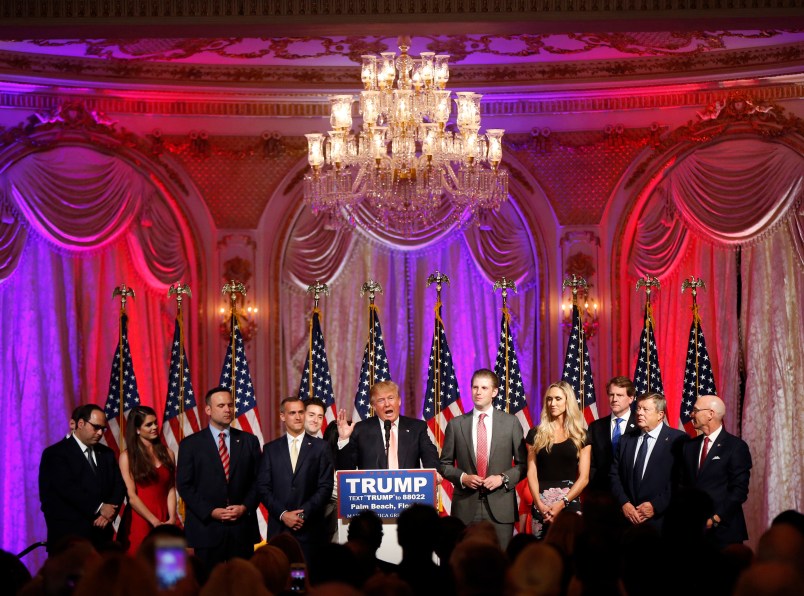Donald Trump has gotten himself in trouble at various points in his campaign for playing songs by musical acts who didn’t approve of their use at his rallies. Most recently, he was excoriated by the producer of the film “Air Force One” for walking out on the Republican National Convention stage Thursday to the movie’s iconic theme song.
The criticism isn’t anything new. Every election cycle comes with its own round of complaints from composers who don’t want their music played by a political candidate whose ideals they don’t share. A candidate needs a license to play a song at a public event, which former Arkansas Gov. Mike Huckabee didn’t have when he infamously played Survivor’s “Eye Of The Tiger” last year at an event with Kentucky clerk Kim Davis.
Here’s where it gets blurry: even if a candidate has the rights to play certain music, the composer of the song still may be able to prevent it from being played if he or she desires.
“Once you have the license in place you can play anything and publicly perform it,” entertainment lawyer Steve Gordon told TPM. “The artist still can have an objection because although you have the license to play music, you didn’t get his permission.”
A campaign may obtain “public performance” licenses from performing rights organizations like ASCAP or BMI, which typically allows for the use of whatever songs are in their catalogs. Trump’s campaign very well may have secured such licenses to play songs on the trail (a spokeswoman didn’t immediately respond Tuesday to TPM’s request for comment).
Even if a campaign has obtained the license to play a particular song, however, experts told TPM the composer of that song could argue that their image was falsely used to sell a product, their trademark was diluted or the campaign falsely suggested they support the candidate.
Experts told TPM that what happens in most cases is the composer of a song asks the offending campaign to stop using his or her music, since litigation is a long, expensive process that leaves composers thinking they’d be better off simply issuing a statement that slaps Trump on the wrist for playing, for example, “Rolling in the Deep.” Artists who’ve said Trump didn’t secure their permission before using their music include Adele, Neil Young, Aerosmith’s Steven Tyler and The Rolling Stones.
“Usually the campaign just decides to relent and not use it anymore because it’s bad publicity,” Gordon said.
While it’s rare is for such a dispute to go to court, that was the case this year for Huckabee. The failed 2016 presidential candidate was ordered to pay $25,000 to Rude Music, run by Survivor member Frank M. Sullivan III, after arguing that it was fair use for him to play “Eye of the Tiger.”
In Trump’s case, as Peter DiCola, a professor of law at Northwestern University specializing in intellectual property, put it, “Maybe Adele’s lawyers are so expensive it might not be worth it with the damages they got. It might not be so enticing.”
When it comes to using music in campaign videos or ads, experts say a whole different set of rules apply, allowing for more people who were involved in the creative process of making a song to object to its use by a political candidate. Using music in video or ads requires permission from the song’s publisher and possibly others from the creative team involved.
DiCola couldn’t recall a recent example where a campaign used a song in an ad or video against the artist’s wishes.
“I think everyone understands when you use music in a video, you have to get a license,” DiCola said.
He also noted that recent high-profile complaints were coming mainly from rock and pop groups who lodged them with Republicans.
“If Hillary [Clinton] were trying to pay Big & Rich or Florida Georgia Line maybe they would object,” he said.







Well… what would be the point …
He probably has NO money —
“Artists who’ve said Trump didn’t secure their permission before using their music include Adele, Neil Armstrong, Aerosmith’s Steven Tyler and The Rolling Stones.”
Neil Armstrong?!
…walking out on the Republican National Convention stage Thursday to the movie’s iconic theme song.
I don’t recall that “iconic theme song.” Who sang it?
Jackson Browne did sue John McCain for using one of his – “Running on Empty” I believe. The lawsuit settled either for no money or a small sum but - more importantly - an agreement that the McCain campaign would not use any other artist’s songs without permission. ------------- There were earlier complaints about Trump using “We Are The Champions” .before its use at the RNC … which (no surprise) apparently had no effect on Trump. Hell, he probably thinks the song was written for him (with the royal “we”).
I have a recommended song for Trump - Back in the USSR